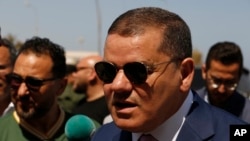Libya and Turkey signed memorandums of agreement in Tripoli, setting the stage for future bilateral collaboration in the hydrocarbon and oil industries.
Turkey's foreign minister, Mevlut Cavusoglu, announced a gas contract during a press conference following the signings.
Turkey has been a prominent backer of Libya’s Tripoli-based government, headed by Abdul Hamid Dbeibah. Ankara’s support for Tripoli’s previous Government of National Accord helped turn the tide of Libya’s civil war.
By supplying Tripoli-backed forces with advisers, equipment and intelligence, President Recep Tayipp Erdogan's government helped thwart a year-long campaign by Gen. Khalifa Hifter — commander of the Libyan Arab Armed Forces in the country’s east — to take the capital.
In 2019, Turkey also signed a controversial maritime border deal with the former Tripoli-based administration, granting it access to a contested economic zone in the eastern Mediterranean Sea. The deal re-ignited Turkey’s pre-existing tensions with Greece, Cyprus and Egypt over oil and gas drilling rights.
Along with the new economic deals, Libyan Foreign Minister Najla El Mangoush said that both delegations agreed to “mobilize international efforts to support a short roadmap for Libyan elections.”
Libya, which has been split between the rival administrations for years, was supposed to hold elections in December 2021.
But the elections were cancelled by Dbeibah following a disagreement over how the electoral process would be conducted. In response, the country’s east-based parliament appointed a rival prime minister, Fathy Bashagha, who has for months sought to install his government in Tripoli.
In a statement published after the press conference, Bashagha condemned the agreements and said the signing of such deals was only “the inherent right of an elected authority.”
